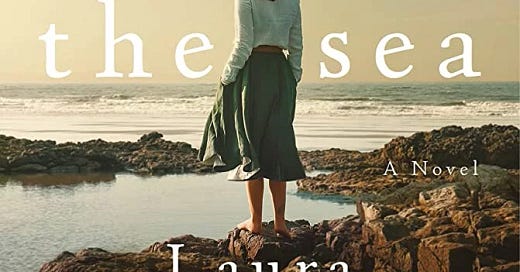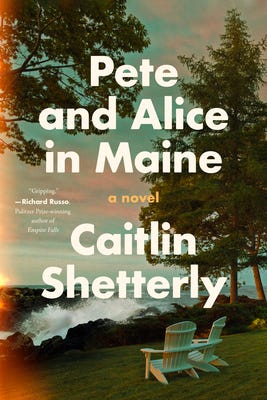I am considering writing a little book about the texture of life as I remember it from birth to age thirteen. (I have learned that it is best for me to name such plans aloud, to put them outside of me and let them take form apart from the machinations of my back and forth.) So I am thinking back and making notes about specific memories. One thing that stands out is how summer was about reading. I drowned myself in words as thoroughly as I was boiled by the waves. I couldn’t get enough, which was maybe a sign that I have what used to be called an addictive personality, or maybe it meant that I got the magic, and understood that I was being most a human being when I was reading. (The other animals have all the rest of the activities in hand.) I still have that feeling. I get through the whole year of school and reading what I need to with not much room for anything else, and I arrive at summer with the thought uppermost in my mind that now I can read what I want to. But the time is limited: I am already feeling the pressure to read for the fall semester, and I have galleys to read for blurbs I’ve promised. Not to mention I am daily pushing forward on a novel draft due in September. Still. I can manage a few new reads, or a few beloved rereads.
What I can’t do is to be as voracious about it as I was as a child. When I think of those days of lavish reading I salivate; it was delicious. I got my summer reading list and asked to go right to the library where I loaded up on as many books as they’d let me take at once. I made short work of the pile, going through at least two books a day, and was usually half way done by the time I went down to Cape May for the summer months. Then I got books from the library there and finished up the list with weeks to spare, so I branched out. My grandparents had a small shelf full of Reader’s Digest compilations, Ian Fleming and James Michener paperbacks, and volumes of collected verse. I plowed through those, read them yearly. Michener in particular had a tremendous impact, especially Hawaii and Tales of the South Pacific. I dreamed of tropical paradises and ocean voyages and thought all I had to do was get older and that would be my life. There was one summer when I refused to go to the beach (a story for the birth - thirteen book) and had whole days to read. My head swam with characters and stories and the meanings I invented for things I didn’t understand. (James Bond is only partially accessible to a nine-year-old, but full of promise of life ahead.) It was a gluttonous kind of reading, the kind where you don’t stop when you have to go out, you take your book and read it in the car, walking around town, anywhere and everywhere. In those days adults made the claim that too much reading would ruin your eyesight, and I was often asked to take a break. Very funny, I snapped back.
I’m sure many reading this post have similar memories. Reading was marvelous. A pure escape. I still love and seek that feeling and find it every so often, when I can shake loose attention to craft. Or if I am so elated by craft that it transports me. This has happened in my listening to the audiobook of Demon Copperhead by Barbara Kingsolver. The reader is a man named Charlie Thurston who is absolutely brilliant at capturing the humor and emphasizing the many lines of wisdom throughout the novel. I highly recommend this for daily walks or a long drive. The novel is stunning, as many have said before me. I teach a course called Literary Fan Fiction where we look at pairings such as David Copperfield and Demon Copperhead. In a recent interview with Kingsolver in The Guardian, she explains the origins of the book and how she came to realize that she could focus her lifelong desire to write a novel about Appalachia through the lens of Dickens during a visit to his study. It is a remarkable story in itself, a visitation of sorts, but it is the case that writers often have their most important writing conversations with authors already dead. They rise up off the pages of their works to guide us. Sometimes the best way to express our admiration for (or our vexation with) an author is to write directly into their texts. It is a powerful form of criticism.
I also read another work of semi fan fiction, The Guest, by Emma Cline. I love her Didioneseque California sensibility and trim suggestive sentences and whipped through this quickly. It didn’t take more than a few pages to realize the ghost of John Cheever was haunting Cline’s pages, particularly his famous short story, “The Swimmer.” Laura Spence-Ash, author of a profound novel newly published and perfect for reading this summer called Beyond That, The Sea (highly recommend) wrote so well about The Guest and Cheever on her substack that I will turn to her to tell you more. (link below.)
Right now I am rereading Jane Hirshfield’s utterly brilliant book of essays called Nine Gates: Entering the Mind of Poetry. It is a book for everyone who loves to think deeply, as she does. I haven’t been more inspired by thoughts on how great writing arrives on the page in a long time. The first essay is called “Poetry and the Mind of Concentration.” I cannot paraphrase, it’s too tightly woven to pull out points, but here is a taste from the opening of the essay:
“Every good poem begins in language awake to its own connections—language that hears itself and what is around it, looks back at those who look into its gaze and knows more than perhaps even we do about who we are. It begins, that is, in the body and mind of concentration.”
Language awake to its own connections…isn’t that a beautiful way to describe what happens when we concentrate on the writing and step away from our fraught efforts? This state of concentration is the what and the why of writing, or so I have come to realize. It seems to me we cannot hate ourselves or doubt ourselves when we concentrate, we recede into the background and allow language to be awake to its own connections. On the contrary, when we concentrate we are open to truth and beauty and have no doubts about why we are here. This is a book not only for poets, but for all who write and who are drawn to the practice of focus.
I have other books in my plans, but it is summer and I want to let books wash up on my shore. I was talking with a friend the other day about our mutual practice of reading books on the shelves of friends’ or rental houses. This is how I read Edith Wharton’s WW I novels in their first editions, now republished but then left behind in favor of her major works. I’d never heard of them and felt like I was reading secrets. I love the deep cuts of favorite writers. So who knows what July will bring?
Next post will be about how I am writing this novel completely differently than I have ever written before—writing is ever surprising. In other news, my paperback is out and about across the land in bookstores, and I have been sent a lot of airport sightings, which for some reason make me giddy. Please pick up a copy if you haven’t read Fellowship Point yet, it’s as summery as it gets. I got the good news last night that it is on the longlist for The 2023 Mark Twain American Voice in Literature Award, in excellent company with great 2022 books.
I am doing three events on Mount Desert Island in Maine this months, on July 18th in Southwest Harbor with Christina Baker Kline, and the next two with Caitlin Shetterly whose wonderful novel Pete and Alice in Maine will be published on July 4th. Those events are at the Northeast Harbor Library on July 19th and the Jessup in Bar Harbor on the 20th. Please come if you are in those parts. I’ll take this opportunity to point you to Caitlin’s excellent site on all things French, Frenchly. I haven’t been to France in ages but I read every word of these lively newsletters and remember the shock of being in Paris for the first time. How can a city be so beautiful?
I’d love to hear what people are reading and how they are reading. Hammock, canoe, up a tree, behind the sofa?






Oh, Alice, you have so returned me to my childhood and early adolescent summer days of losing myself in books (and being chastised for ruining my eyesight). How I loved that, and missed it, once I had to start having summer jobs. I remember, too, in school, being caught by a teacher reading instead of doing whatever assignment I was supposed to be doing, scolded and how she firmly closed and took the book away from me. I wonder now which cadences of good writing and which small moments of insight in crafted words gave me the notion that I, too, could do this? When exactly did that spark get lit and never be extinguished? Thank you for another lovely essay.
I loved Beyond That, The Sea. It was so well written - a quiet novel that resonates. I just finished Go As A River by Shelley Read and loved that as well. I am now starting Bird Hotel by Joyce Maynard. I join you in your feelings about reading and how childhood summers were even more special with a book in hand. To this day I always have a book with me. Reading simply makes life better.